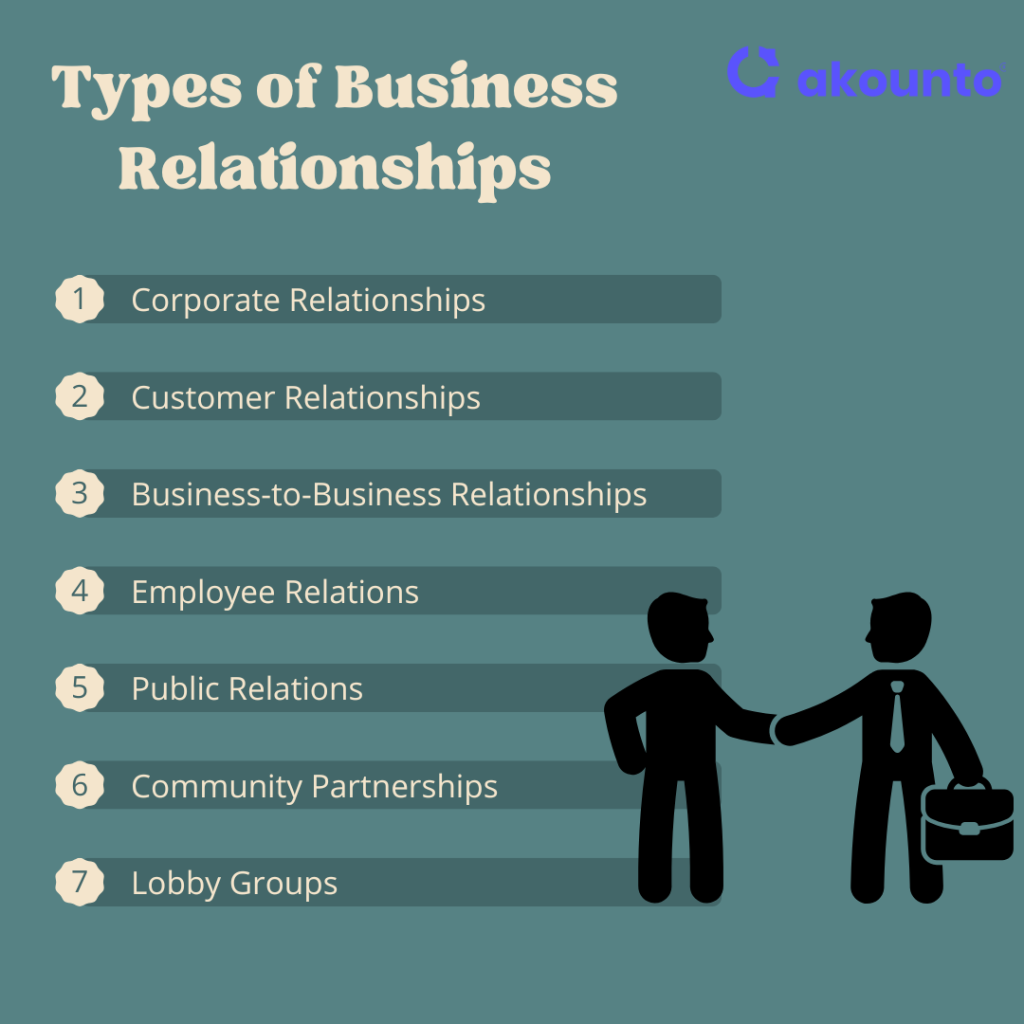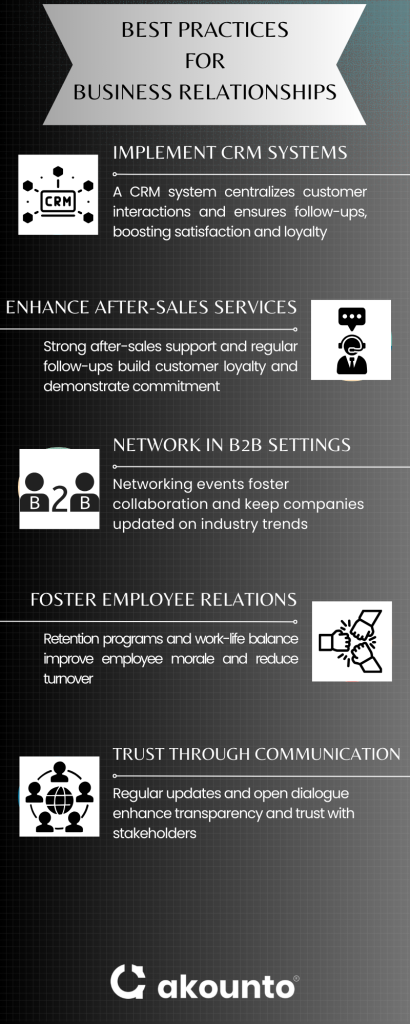
Building Business Relationships for Scaling and Growth
Business relationships gets you repeat customers, business sustainability, successful marketing, building brand loyalty, and in most cases growth and scalability for businesses.
Building business relationships is a conscious and targeted effort which leads to more customers, acquiring corporate partners, building brand visibility, customers become brand ambassadors, reduces the cost of marketing for the businesses, and much more.
By prioritizing business relationships, businesses create a mutually beneficial dynamic, allowing each side to gain value and enhancing long-term stability.
In a market where people drive success, companies must go beyond simply offering a product or service; they need to connect meaningfully with customers, partners, and even interest groups. Strong business relationships not only foster repeat customers but also encourage those customers to act as advocates, helping to increase brand visibility organically.
Beyond customer connections, strategic partnerships with industry bodies or collaborations with other enterprises can lead to new opportunities and fresh insights, supporting a business’s growth goals.
Whether through customer engagement programs, networking, or community partnerships, each interaction strengthens the business's position, empowering it to adapt, grow, and thrive in an ever-evolving marketplace.
"Customer retention is far more profitable than acquiring a new customer. If you retain atleast 10% of your customers, then your profits will be upward of 60%. This means less expenditure on marketing. I would rather suggest that business should invest in building customer relations in same priority as the expenditure on marketing."
Soniya Malik -Founder and CEO, Akounto Financial Services
Advantages of Building Business Relationships
Competitive Advantage
Building strong business relationships is like having a secret ingredient that others can’t replicate. When companies focus on fostering trust and mutual respect with clients, suppliers, and partners, they create a competitive edge that goes beyond products and pricing.
Companies that build trust and consistently deliver value can position themselves as preferred partners, a significant advantage in a fast-paced business world. For example, Apple’s close partnerships with its suppliers enable it to maintain high quality and efficiency that competitors struggle to match.
Customer Retention
Customer relationships are not just about making sales but about creating loyalty. When clients feel valued and understood, they are far more likely to return. By focusing on customer relationship-building rather than transactional exchanges, businesses enhance customer loyalty and retention, ultimately reducing marketing expenses.
Engaging customers regularly, personalizing their experience, and addressing concerns promptly build trust that keeps them coming back. Companies with high customer retention rates, like Amazon, demonstrate how prioritizing customer satisfaction creates a steady revenue stream and a base of loyal advocates.
Apple Inc. with its Apple stores is well known to create a memorable experience for the customer be it in their stores or using ther product or services. It is much easier to cross sell when the customer trusts your brand and story.
Long-Term Business Success
Companies that invest in long-term partnerships—whether with customers, vendors, or even competitors—build a robust network that supports resilience and adaptability. These partnerships often lead to valuable collaborations, shared resources, and trusted referrals.
Focusing on long-term success rather than short-term gains delivers stability, making it easier for a business to weather market fluctuations.
Increase in Sales
Building strong relationships doesn’t just retain customers; it opens doors to new opportunities and revenue. Satisfied clients often refer their connections, creating a natural marketing chain that brings in new business without significant investment. Additionally, long-standing relationships make it easier to cross-sell and upsell because clients trust the value being offered. This organic growth can lead to substantial sales increases, amplifying revenue potential.
For example, Tesla’s community of loyal customers has turned into a powerful, grassroots sales force, recommending the brand to others and driving sales growth.
Employee Retention
Happy employees are one of the greatest assets for any business, and positive relationships within the company foster a productive and stable work environment. When companies connect with their employees and show genuine interest in their development, loyalty grows. This sense of belonging reduces turnover, leading to a more experienced, committed team that is motivated to deliver exceptional results.
Companies like Google are known for their focus on employee well-being and growth, which has proven essential in retaining talent in competitive fields.
Branding of the Company
Good relationships shape a company’s reputation. By consistently delivering value to clients, partners, and the community, companies create a positive brand image that goes beyond marketing campaigns. This reputation becomes part of the company’s identity, leading clients and partners to see it as trustworthy and dependable.
Strong branding that’s built on relationships is hard to beat—it’s like being the go-to person in a tight-knit community.
Coca-Cola’s emphasis on community connection and customer happiness has made it one of the most recognized and trusted brands worldwide.
Types of Business Relationships

Corporate Relationships
Corporate relationships are connections with entities such as suppliers, distributors, and strategic partners. These business relationships ensure that a company has reliable access to the resources, products, and services it needs to operate smoothly.
Building and managing corporate business relationships is essential for negotiating favorable terms, securing priority support, and gaining competitive insights. Without these alliances, a business may face supply chain disruptions or increased costs, directly impacting its ability to meet customer demands and remain competitive in the industry.
Customer Relationships
Customer relationships form the backbone of a company’s success. Engaging with customers through meaningful interactions—whether through support calls, personalized offers, or constructive feedback—builds loyalty and trust.
A strong relationship encourages repeat business and turns customers into advocates, while a lack of engagement can lead to lost sales and a weakened reputation. Maintaining these connections goes beyond transactions; it’s about making clients feel valued and ensuring their needs are met, which is essential for long-term success.
Business-to-Business Relationships (B2B Relationships)
B2B relationships are the connections companies build with other businesses to create mutually beneficial outcomes. These partnerships might include collaborations for product development, shared marketing efforts, or joint ventures.
Effective B2B relationships open doors to new markets, shared resources, and valuable insights. If not nurtured, however, these partnerships can weaken, leading to lost opportunities and diminished business growth. Successful B2B relationships are built on trust and aligned goals, providing stability and fostering innovation that benefits both parties.
Employee Relations
Employee relations are the connections a company has with its workforce. Maintaining positive relationships with employees is vital to fostering a productive work environment, improving morale, and encouraging loyalty. When employees feel supported, they’re more likely to invest in the company’s success.
A poor employee relations can lead to high turnover, lowered productivity, and a loss of institutional knowledge, all of which can hinder a company’s progress. Listening to employees, offering growth opportunities, and showing appreciation are key to building lasting loyalty.
Public Relations
Public relations (PR) encompasses a company’s relationship with the general public, media, and other stakeholders. A strong PR strategy builds a positive brand image and handles public perceptions effectively, supporting a company’s reputation and trustworthiness.
PR is essential for managing crises, promoting new business offers, and maintaining a positive public image. Neglecting PR can lead to misunderstandings, reputational damage, or lost trust from the community, which can ultimately harm a business’s standing and its relationships with other stakeholders.
Community Partnerships
Community partnerships involve collaborations between businesses and local communities, often focused on social initiatives, support programs, or events that align with community values. These relationships help businesses build trust, demonstrate social responsibility, and create a positive reputation within the community.
A company that actively supports its community often gains a loyal customer base and enhanced brand image. Without these partnerships, businesses risk appearing disconnected or indifferent to community needs, potentially losing local support and customer loyalty.
Lobby Groups
Lobby groups are organizations that businesses may collaborate with to influence policy changes or industry regulations. For many industries, staying ahead of regulatory changes is essential to business continuity and growth. By working with lobby groups, companies can advocate for favorable conditions, communicate industry challenges, and ensure their interests are represented.
How to Build Strong Customer Relationships?
Building strong customer relationships is a process that goes beyond a single transaction. To create lasting connections, businesses must approach relationship-building as an ongoing effort that involves every customer touchpoint, from marketing to after-sales support. This begins with early initiatives like content marketing and influencer marketing, which allow companies to connect with potential customers and demonstrate value long before a purchase is made. These steps lay the foundation for meaningful business relationships by showcasing the brand’s personality, knowledge, and trustworthiness.
Effective customer relationship programs are another critical component. These programs help manage and develop existing relationships by offering rewards, personalized offers, and consistent engagement, which keep customers feeling valued. Strong programs not only build business relationships but also ensure a consistent experience across all interactions, helping customers feel connected to the brand.
After-sales support is equally essential. A good business relationship doesn’t end once the product is delivered; support teams must be equipped to address customer needs, provide guidance, and handle any concerns. Regular follow-ups, through phone calls or feedback requests, show customers that their satisfaction matters. This feedback loop is vital for understanding customer needs and identifying areas for improvement, ensuring that the company can continuously enhance its service.
Marketing is not just about selling; it’s about nurturing the relationship with existing customers. Engaging content, authentic social media interactions, and email updates about new products or company achievements keep the business top-of-mind and reinforce trust.
Customer support teams play a central role in ensuring a positive, consistent experience. Whether through live chats, phone calls, or emails, these teams are the frontline of customer care, managing inquiries, addressing complaints, and strengthening the business relationship.
A successful approach to customer relationships involves addressing concerns proactively, delivering on promises, and consistently adding value at every stage of the customer journey.
Best Practices for Business Relationships

Building strong business relationships requires practical strategies that address various stakeholder needs. One effective approach is to deploy a Customer Relationship Management (CRM) system, which helps map the customer journey, respond and engage customers at each stage. CRM tools centralize interactions, track feedback, and ensure consistent follow-ups, making it easier to build and maintain lasting customer relationships.
For customer satisfaction, robust after-sales services are essential. Providing efficient support, quick issue resolution, and accessible service channels reassures customers and builds loyalty. Regular follow-ups, such as feedback calls or emails, reinforce trust and show a commitment to ongoing satisfaction.
In B2B settings, attending networking events and conducting outreach programs opens up avenues for collaboration, new ideas, and valuable partnerships. These events allow companies to build relationships with other businesses, stay updated on industry trends, and explore new opportunities for growth.
Employee relations are equally important. Programs focused on employee retention, loyalty rewards, and work-life balance demonstrate a company’s investment in its team. Offering benefits, career development opportunities, and flexible working conditions fosters loyalty, improves morale, and reduces turnover, which ultimately strengthens the company’s internal relationships.
Conclusion
A business relationship serves many functions than just marketing and customer retention. When customer becomes your brand ambassador you know the demand for your product or service and it do impacts monetarily in your company valuation and goodwill.
Getting funding for expansion, influencing a policy change, community relations for peaceful working, vendor relations for qualitative and continuous supply etc.




